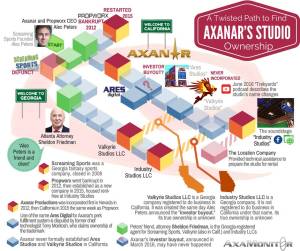
Plans for improvements to Industry Studios, the commercial facility producer Alec Peters built using funds raised from Star Trek fans for production of the film Axanar.Image/Industry Studios
Another Company Emerges in Axanar Studio Ownership
Table of Contents
See also: Twisted Path to Discover Axanar's Studio Ownership and Investor Group Plans to Buy Axanar's Studio Assets
Court documents reveal producer Alec Peters is behind another company that holds the lease to the studio he built using funds he raised from Star Trek fans to produce the film, Axanar.
The revelation came as part of several motion responses filed January 6, 2017, by attorneys for plaintiffs CBS and Paramount Pictures, who are suing Peters and his company, Axanar Productions, for copyright infringement.
The studios were responding to efforts by Peters and his attorneys to keep evidence from the jury, including:
- Using the term “Star Trek” with reference to Axanar. The defendants had argued the “Star Trek” is a trademark, therefore not relevant to the alleged copyright infringement for which Peters was being sued.
- Any reference to the defendants having made any profits from Axanar.

Industry Studios
According to statements by Peters, between $475,957 and $742,957 was spent building out the commercial studio Peters wanted to use for future for-profit projects and rent out to other film and television productions. But the actual ownership of the company operating the studio has been deliberately obscured since Peters announced in March 2016 that a secret investor group was reimbursing Axanar in exchange for the studio.
An AxaMonitor investigation found a tangled web of anonymous shell companies established by Peters’ attorney in Atlanta possibly connected to the studio.
Profiting from the Trek-Paid Studio
The studios alleged Peters had used the donor funds raised using Star Trek to create the movie studio that would provide him personally with future profits:
Plaintiffs will also introduce documents and testimony demonstrating Defendants’ plans to use the movie studio (built using funds raised to produce the Axanar Works), the lease to which [company name redacted], a for-profit corporation solely owned by Peters, and Peters personally, to generate a profit from additional independent films.1)
With the company name redacted, it appeared the court document referred to yet another Peters-owned business apart from his production company, Axanar Productions Inc., which is his co-defendant in the copyright lawsuit, or Propworx, his prop auction company also housed, rent-free, at the studio facility.
Profiting Off Star Trek
While the studios’ case against Axanar is not a trademark dispute, the plaintiffs nonetheless maintained that Peters’ use of Star Trek in creating infringing works remained relevant to the case:

Peters himself advertised his works, and raised money for his Axanar Works, by touting them as “authentic” Star Trek, an “independent Star Trek film,” and stated “this is Star Trek.” To argue, as Defendants do, that these statements should be excluded from the trial on whether Defendants copied Star Trek is absurd.2)
Moreover, Peters’ use of “Star Trek” brought him direct financial benefits, including the commercial studio he built for future, for-profit productions, and to rent out to other projects, the plaintiffs’ documents stated:
Peters’ labeling of his Axanar Works with the term “Star Trek” (before he changed the titles of his works), is relevant to Peters’ attempts to obtain a profit from his infringing activities – he used the term “Star Trek” to raise money from Star Trek fans, so that he could pay himself and his colleagues. Indeed, one of Peters’ own communications (which he did not turn over in discovery) shows that he discussed keeping the name “Star Trek” on an internet page promoting the Axanar Works because, to remove that phrase would decrease the amount of funds he was able to raise.3)
Direct Financial Benefit
One of the lawsuit’s causes of action against Peters is “vicarious copyright infringement” — that he personally received a direct financial benefit from copying Star Trek, including payment of a variety of personal expenses such as tens of thousands of dollars of restaurant bills, gasoline, car and health insurance, auto maintenance and phone bills for himself, his girlfriend and another friend.4)
The allegations of vicarious copyright infringement require the studios to prove Peters:
- Directly financially benefited (note the law does not use the term ‘profit’) such as his personal expenses and salary.
- Supervised or controlled Axanar’s infringing activity.5)
Keywords
